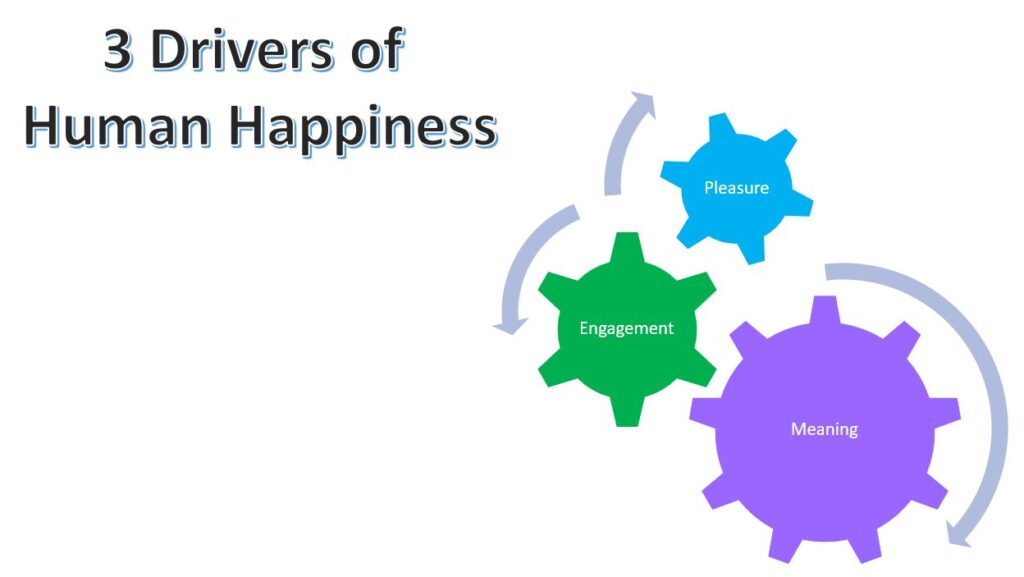Len was old school!
What he learned about leadership was from his forty some years serving in the Marines and working at a Fortune 500 company. Therefore, I was not surprised when he informed me, “It’s not my job to be concerned about my employees’ happiness!” He delivered this comment with heat and frustration.
Len came out of retirement to lead a struggling small business and I met him when he attended a public presentation that I delivered on The High Road® Leader ™. Len sat in the front row, and I noticed his body tense up during the part of my program where I explain the “caring” aspect of leading from the High Road®. I had informed this audience, “A high-quality leader always stives to improve the happiness of their employees.” Since he strongly disagreed with my statement, he felt the need to challenge me and that is why over coffee, we chatted after my presentation.
This is a gist of my explanation to Len.
Happiness and the Great Leader
Do you believe that a leader has the responsibility for the happiness of their employees?
Thinking about and increasing the level of employee happiness in their organization is every leader’s responsibility!
As happiness is about the individual, you (a leader) must understand it at your level before you can beneficially affect the happiness of your employees. I will explain why to do it and then how to do it.
Excessive Stress
You are well aware of the enormous pressures on everyone today. This is why we see many incidents of sudden rage, increased drug use, abnormally high employee turnover, fear of the workplace, and other indicators of stress reaction. One truism about the human condition is this:
• When you are enjoying something, the negative impact of stress decreases. Therefore, when you feel happy or joyful, you are less stressed by what is going on around you.
Think about a time when you were driving through heavy traffic and your favorite tune played on the radio. This music causes you to move and belt out the lyrics. In that moment you are tuning into a happy feeling and tuning out your frustratingly slow progress to the destination and why happiness matters!
Benefits of Happy Employees
Research shows happy people are:
• More productive in their jobs.
• Less hostile, more cooperative.
• Healthier.
• Living longer.
• More optimistic.
• Seeing situations as opportunities instead of problems.
Notice that these benefit the individual as well as the organization they work for.
Factors of Employee Happiness
Research has isolated the factors that contribute to a person being happy along with three consistent components to an employee’s feelings of joy and happiness.
Let’s start with the major factors that contribute to feelings of happiness in humans.
Behavioral Factors
• Eating foods with high fat or sugar content (maple bacon anyone?)
• Exercise (who says no to more endorphins?)
• Shopping (especially when you find the right gift for someone you care about)
This last one – shopping – will show up again in How to Increase One’s Happiness.
Personality Factors
The individual’s personality influences 50% of their happiness. Some people are predisposed for happiness. Extroverts tend to be happier because a social network in vital to feeling good. A person with higher self-esteem tends to be happier and a happy person tends to find the positive aspect in life. Notice that this self-esteem contributor is a paradox.
Here is another paradox of happiness: Optimistic people tend to be happier and happy people are more likely to have higher levels of optimism.
Relationships Factor
There is tremendous power in having good relationships., which improves a person’s happiness. The key is the quality of the relationship vs. the quantity of friends. In other words, it is better that your employee has at last one close friend on the team rather than be quasi-friends with everyone on your team. The endgame in a quality relationship is the willingness and ability to have intimate conversations. These dialogs are necessary for a healthy close relationship. The presence of a cell phone, earbuds, or other digital device interferes with intimate conversations.
Three Gears that Drive Human Happiness
Imagine three connected gears that drive a machine, which is the level of happiness (i.e., quotient) within your employee. All three are necessary to experience sustained feelings of joy or happiness in good times and bad.

- Pleasure. This is the least important gear (and smallest) because pleasure is momentary. Therefore, treating your employees to lunch or ice cream on a hot day will supply happiness for an hour but then the feeling is soon gone.
- Engagement. This gear is important because when an employee is engaged deeply in something, they feel good and their self-esteem soars. This pleasure feeling starts with the anticipation of something engaging. Recall how you feel when planning a vacation or a night out.
- Meaning. This is the most important and necessary gear; the largest of the three. Doing things in life and on the job that bring a person meaning increases their engagement and those increase the pleasure they feel about work and life.
The Power of Genetics in One’s Happiness
Your genetic makeup influences 50% of your happiness. Yes, some people are born with a proverbial smile on their face and a sunny disposition. But feeling happy requires work and effort. Even if you lack the happy gene like me (yes me!), the good news is that happy people make the effort to improve their own happiness constantly, which leads to another truism and Natural Law of Being Human: Feeling happy can be learned because it is a skill.
How to Increase One’s Happiness Quotient
While this list of actions is directed at the personal “you” perspective, think about which ones you influence as their leader.
- Change your behaviors e.g., better sleep, more exercise, regular meditation.
- Find your match personally and professionally. Do your skills and desires align with your job duties? What about for your employees? IDEA: Help employees find greater alignment
- Spend time in nature.
- Express gratitude in the moment you feel it.
- Conduct a gratitude visit. Write a letter to someone who helped shape your life, visit with them and read your letter to them.
- Smile even when you are not feeling happy. This is where learning the skill comes in.
- Give a gift to someone. This includes donating your time and money and why shopping for that right gift jumpstarts your good feelings.
- Spend money wisely. Purchase and give gifts of experiences instead of things.
- Avoid comparisons. When you compare yourself to someone else, it is a guaranteed way to spark feelings of inadequacy and incompetence.
- Build and keep quality relationships. This is the best predictor of your happiness, but quality relationships take work. Yet, it is the most important way to experience greater happiness.
Back to Len
I could tell that Len was not a happy person by nature so the idea of caring enough to help increase the level of happiness within his employees was inconceivable. However, he was willing to learn this vital leadership skill. Serving as his coach, it took many months of effort, practice, and feedback to change his mind and build his skill. Today, Len proudly says, “I’m happy.” He does his best each day to help his employees feel good about their work and themselves.
Summary
Yes, it is possible and an imperative to increase the level of happiness your employees feel. Doing this leads to employee longevity, greater productivity, and a conflict-free workplace.
Recent research has isolated three consistent predictors and indicators of a person’s level of happiness.
- Amount of time you spend in nature.
Ideas: Hold meetings outdoors. Offer to take walks with coworkers during lunch breaks. Form after work walks or weekend hikes (optional of course).
- Quality of your work relationships.
Ideas: Hire a coach who specializes in teamwork and cooperation. Do the work to set up and keep up high quality, intimate relationships with each employee. Foster relationships that are capable of substantive conversations between the two of you.
- Amount of time and energy you give for other people’s benefit.
Ideas: Sponsor donation drives that employees can take part in. Give your employees gifts and do so thoughtfully.
Looking for more ideas? I recommend these books.
Are your employees overly stressed? Do you feel the urgent need to improve employee morale? I can help you implement solutions. Click here to set a time to discuss your concerns.

